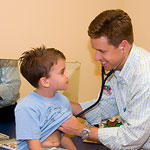World Immunization Week is the last week of April, and it’s the perfect time to talk about the importance of immunization. In the past 50 years, vaccines have saved more than a billion people and made life better for everyone by preventing more illnesses and disabilities than we can count. Before vaccines, illnesses like polio, smallpox, tetanus, and measles killed and disabled thousands every year. Vaccination is one of the best tools we have to reduce fatal and debilitating communicable diseases and make a safer, healthier world.
How Vaccines Work
Vaccines operate on a well-established scientific principle. When your immune system encounters disease-causing bacteria or viruses, it responds by producing antibodies that fight off the disease. Your body fights off many minor bacterial or viral invasions, and you often aren’t even aware of it. Unfortunately, some diseases are potent enough to spread throughout your body before your immune system can increase antibody production to fight it off. For these diseases, vaccines act as training for your body by kick-starting antibody production.
Vaccines are made of dead or weakened versions of the disease that trigger your immune system. The pathogens in the vaccine can’t infect you, but your body can still recognize them and start producing antibodies. If you’re exposed to the disease in the future, your immune system will already have the antibodies necessary to battle it. Thus, the disease won’t get established in your body.
Vaccines protect a person from disease—sometimes for a period of time, and sometimes for the rest of his or her life. It’s important to note that along with providing immunity for an individual, vaccines work to eradicate a disease from an entire group. The more people that are immunized, the fewer chances a disease has to infect enough people to survive. Eventually, immunizations could completely prevent serious contagious diseases.
When to Get Vaccines
To protect against death and disability, vaccinations should begin early in an infant’s life and continue regularly throughout childhood and adolescence. Consult with your pediatrician for a specific schedule or click here to review our immunization schedule, but general guidelines indicate that children should begin vaccination during their first year against Hepatitis B, Tetanus, Diphtheria, Whooping Cough (Pertussis), Polio, Measles, Mumps, Rubella, and a number of other illnesses.
Additionally, adults and children who travel to new countries should be vaccinated against diseases they may encounter. For example, yellow fever is common in parts of South America and Africa, so travelers to these parts of the world should get the yellow fever vaccine.
Vaccines are an effective medical advancement that continues to save lives every day.
If you have questions about vaccines, discuss them with your pediatrician.
The information and content on our website should not be used as a substitute for medical treatment or advice from your doctor.




